Self-Assessment Report on Organisational Behaviour
VerifiedAdded on 2022/11/14
|10
|2302
|171
AI Summary
This report is a self-assessment report on Organisational Behaviour. It helps to identify the key strength and weakness of a person. Self-assessment also helps to improve the weakness and improve those skills, which are required to become a good leader. The report evaluates the personality of the person based on four personality tests, which are Mcclelland Need Analysis, conflict mode instrument of Thomas Kilman, Big Five personality test, MBTI, and. The report helps to develop specialised goals and objectives for life and identify the needs that are required to achieve the future target.
Contribute Materials
Your contribution can guide someone’s learning journey. Share your
documents today.
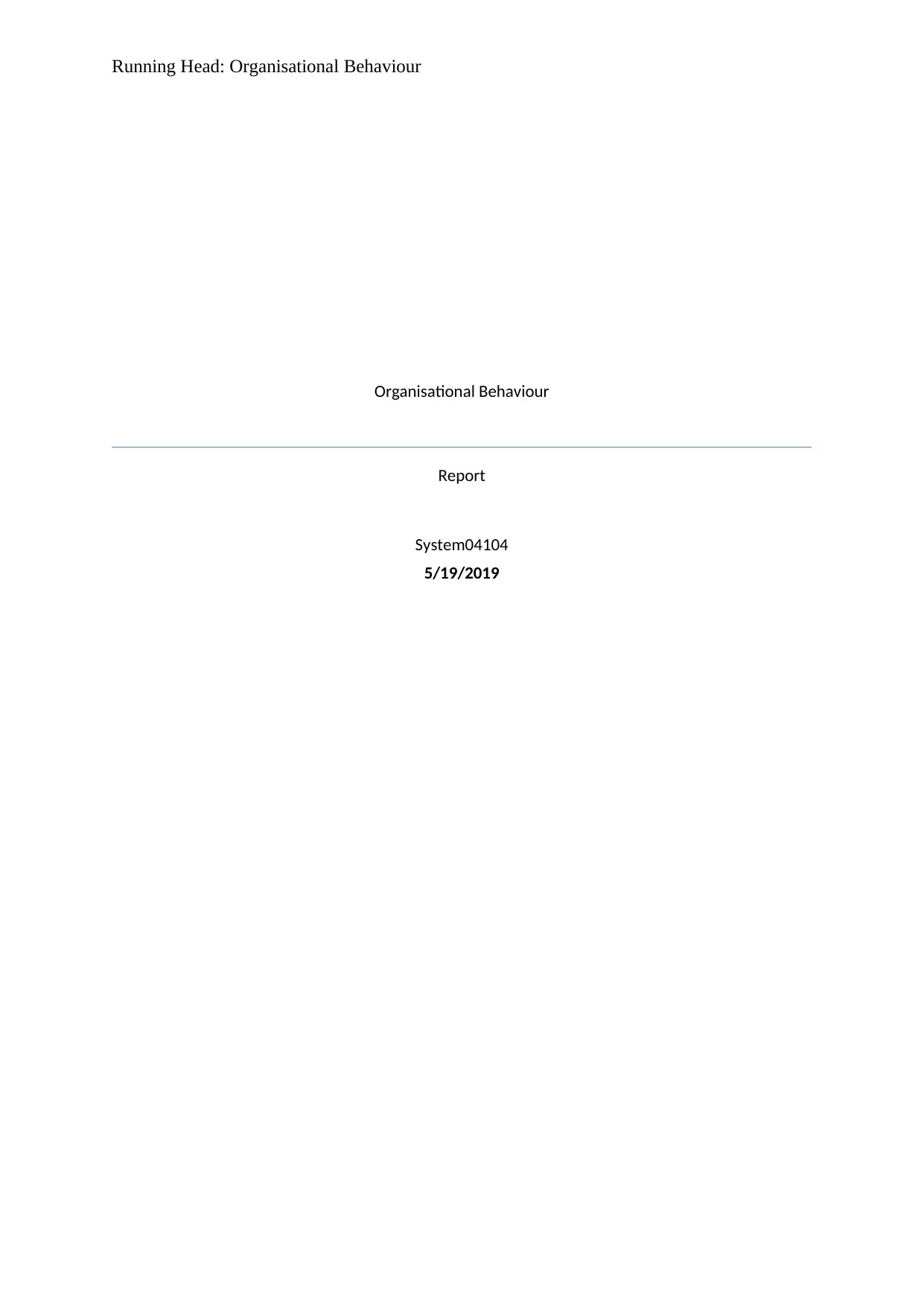
Running Head: Organisational Behaviour
Organisational Behaviour
Report
System04104
5/19/2019
Organisational Behaviour
Report
System04104
5/19/2019
Secure Best Marks with AI Grader
Need help grading? Try our AI Grader for instant feedback on your assignments.
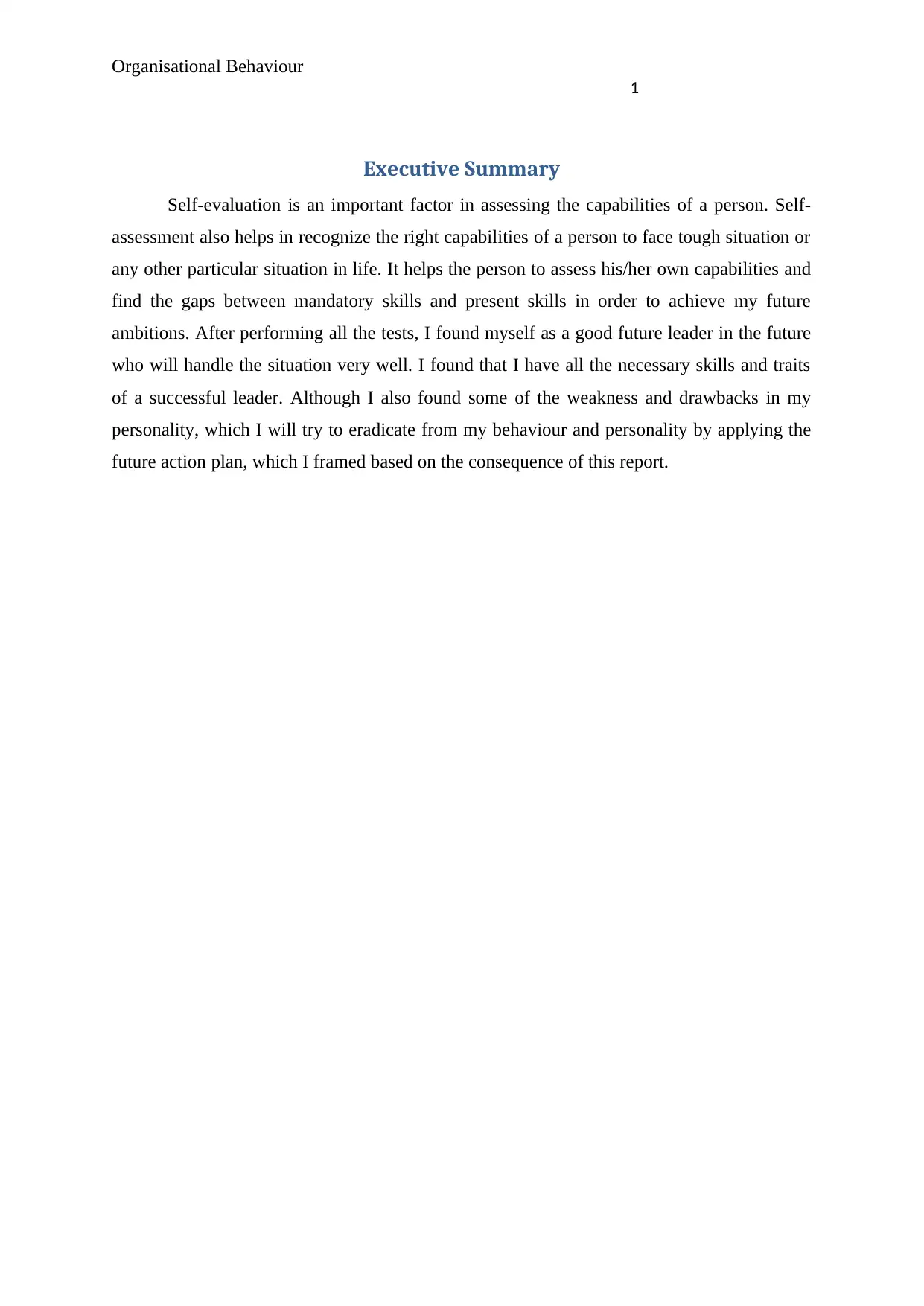
Organisational Behaviour
1
Executive Summary
Self-evaluation is an important factor in assessing the capabilities of a person. Self-
assessment also helps in recognize the right capabilities of a person to face tough situation or
any other particular situation in life. It helps the person to assess his/her own capabilities and
find the gaps between mandatory skills and present skills in order to achieve my future
ambitions. After performing all the tests, I found myself as a good future leader in the future
who will handle the situation very well. I found that I have all the necessary skills and traits
of a successful leader. Although I also found some of the weakness and drawbacks in my
personality, which I will try to eradicate from my behaviour and personality by applying the
future action plan, which I framed based on the consequence of this report.
1
Executive Summary
Self-evaluation is an important factor in assessing the capabilities of a person. Self-
assessment also helps in recognize the right capabilities of a person to face tough situation or
any other particular situation in life. It helps the person to assess his/her own capabilities and
find the gaps between mandatory skills and present skills in order to achieve my future
ambitions. After performing all the tests, I found myself as a good future leader in the future
who will handle the situation very well. I found that I have all the necessary skills and traits
of a successful leader. Although I also found some of the weakness and drawbacks in my
personality, which I will try to eradicate from my behaviour and personality by applying the
future action plan, which I framed based on the consequence of this report.
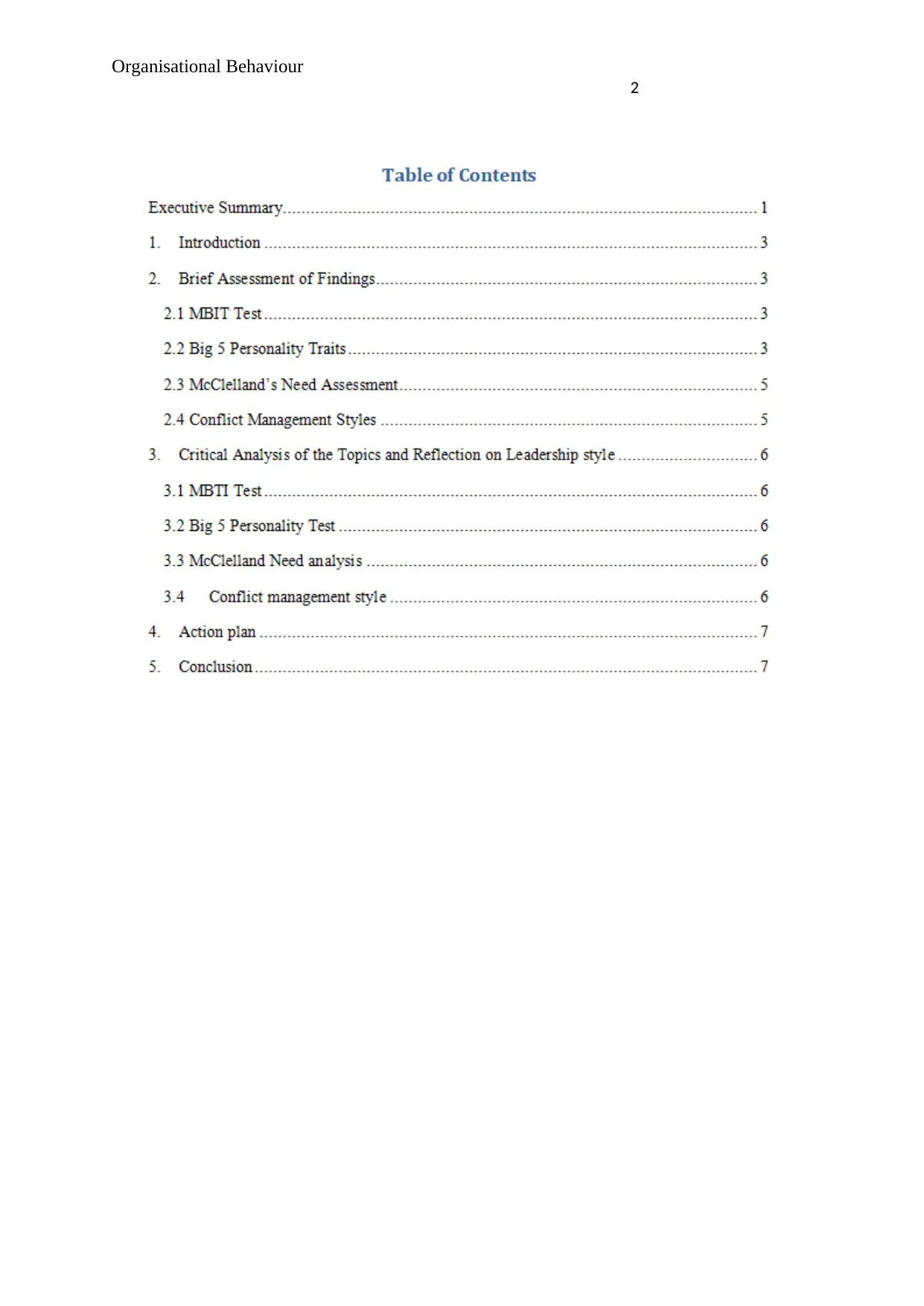
Organisational Behaviour
2
2
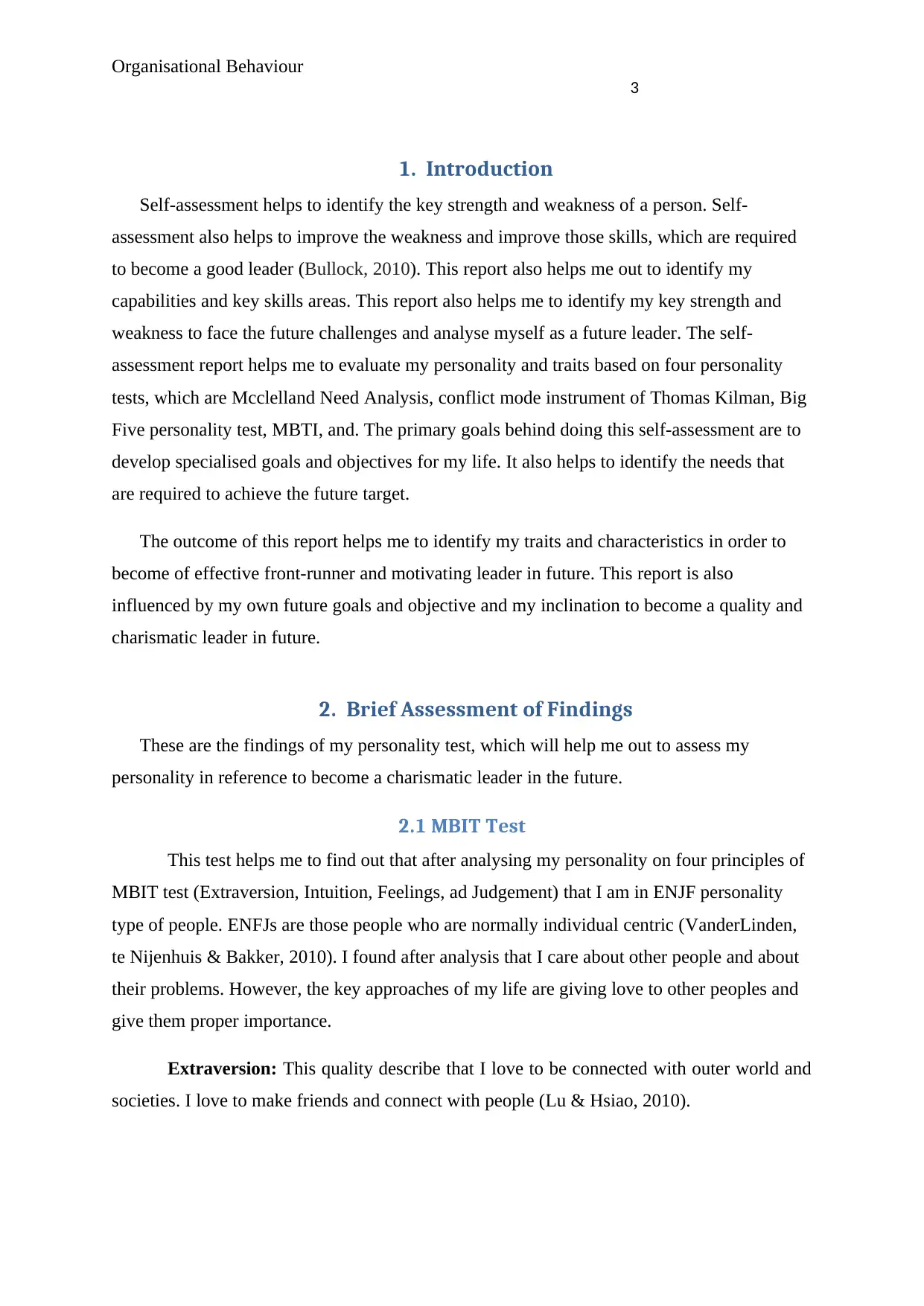
Organisational Behaviour
3
1. Introduction
Self-assessment helps to identify the key strength and weakness of a person. Self-
assessment also helps to improve the weakness and improve those skills, which are required
to become a good leader (Bullock, 2010). This report also helps me out to identify my
capabilities and key skills areas. This report also helps me to identify my key strength and
weakness to face the future challenges and analyse myself as a future leader. The self-
assessment report helps me to evaluate my personality and traits based on four personality
tests, which are Mcclelland Need Analysis, conflict mode instrument of Thomas Kilman, Big
Five personality test, MBTI, and. The primary goals behind doing this self-assessment are to
develop specialised goals and objectives for my life. It also helps to identify the needs that
are required to achieve the future target.
The outcome of this report helps me to identify my traits and characteristics in order to
become of effective front-runner and motivating leader in future. This report is also
influenced by my own future goals and objective and my inclination to become a quality and
charismatic leader in future.
2. Brief Assessment of Findings
These are the findings of my personality test, which will help me out to assess my
personality in reference to become a charismatic leader in the future.
2.1 MBIT Test
This test helps me to find out that after analysing my personality on four principles of
MBIT test (Extraversion, Intuition, Feelings, ad Judgement) that I am in ENJF personality
type of people. ENFJs are those people who are normally individual centric (VanderLinden,
te Nijenhuis & Bakker, 2010). I found after analysis that I care about other people and about
their problems. However, the key approaches of my life are giving love to other peoples and
give them proper importance.
Extraversion: This quality describe that I love to be connected with outer world and
societies. I love to make friends and connect with people (Lu & Hsiao, 2010).
3
1. Introduction
Self-assessment helps to identify the key strength and weakness of a person. Self-
assessment also helps to improve the weakness and improve those skills, which are required
to become a good leader (Bullock, 2010). This report also helps me out to identify my
capabilities and key skills areas. This report also helps me to identify my key strength and
weakness to face the future challenges and analyse myself as a future leader. The self-
assessment report helps me to evaluate my personality and traits based on four personality
tests, which are Mcclelland Need Analysis, conflict mode instrument of Thomas Kilman, Big
Five personality test, MBTI, and. The primary goals behind doing this self-assessment are to
develop specialised goals and objectives for my life. It also helps to identify the needs that
are required to achieve the future target.
The outcome of this report helps me to identify my traits and characteristics in order to
become of effective front-runner and motivating leader in future. This report is also
influenced by my own future goals and objective and my inclination to become a quality and
charismatic leader in future.
2. Brief Assessment of Findings
These are the findings of my personality test, which will help me out to assess my
personality in reference to become a charismatic leader in the future.
2.1 MBIT Test
This test helps me to find out that after analysing my personality on four principles of
MBIT test (Extraversion, Intuition, Feelings, ad Judgement) that I am in ENJF personality
type of people. ENFJs are those people who are normally individual centric (VanderLinden,
te Nijenhuis & Bakker, 2010). I found after analysis that I care about other people and about
their problems. However, the key approaches of my life are giving love to other peoples and
give them proper importance.
Extraversion: This quality describe that I love to be connected with outer world and
societies. I love to make friends and connect with people (Lu & Hsiao, 2010).
Secure Best Marks with AI Grader
Need help grading? Try our AI Grader for instant feedback on your assignments.
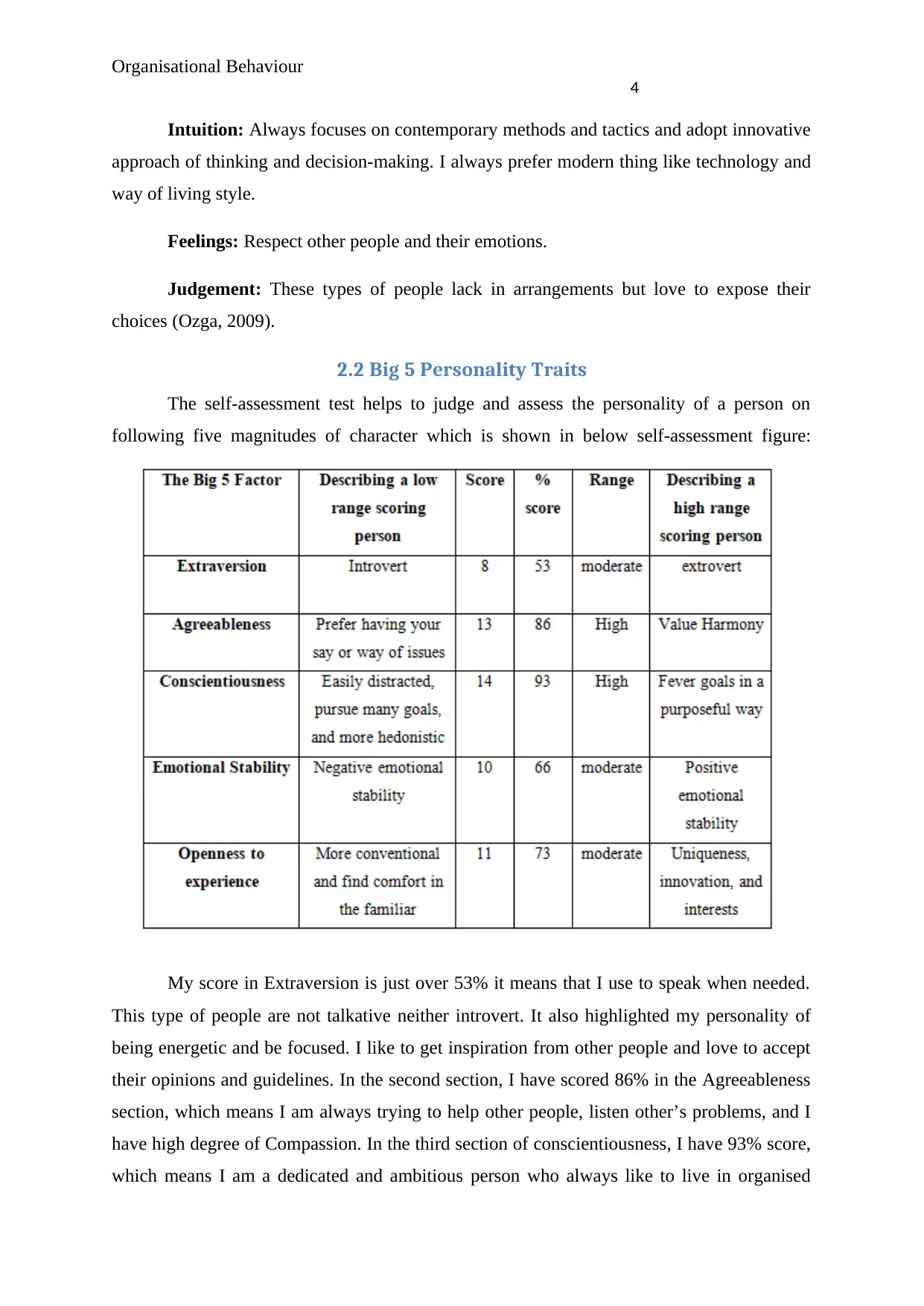
Organisational Behaviour
4
Intuition: Always focuses on contemporary methods and tactics and adopt innovative
approach of thinking and decision-making. I always prefer modern thing like technology and
way of living style.
Feelings: Respect other people and their emotions.
Judgement: These types of people lack in arrangements but love to expose their
choices (Ozga, 2009).
2.2 Big 5 Personality Traits
The self-assessment test helps to judge and assess the personality of a person on
following five magnitudes of character which is shown in below self-assessment figure:
My score in Extraversion is just over 53% it means that I use to speak when needed.
This type of people are not talkative neither introvert. It also highlighted my personality of
being energetic and be focused. I like to get inspiration from other people and love to accept
their opinions and guidelines. In the second section, I have scored 86% in the Agreeableness
section, which means I am always trying to help other people, listen other’s problems, and I
have high degree of Compassion. In the third section of conscientiousness, I have 93% score,
which means I am a dedicated and ambitious person who always like to live in organised
4
Intuition: Always focuses on contemporary methods and tactics and adopt innovative
approach of thinking and decision-making. I always prefer modern thing like technology and
way of living style.
Feelings: Respect other people and their emotions.
Judgement: These types of people lack in arrangements but love to expose their
choices (Ozga, 2009).
2.2 Big 5 Personality Traits
The self-assessment test helps to judge and assess the personality of a person on
following five magnitudes of character which is shown in below self-assessment figure:
My score in Extraversion is just over 53% it means that I use to speak when needed.
This type of people are not talkative neither introvert. It also highlighted my personality of
being energetic and be focused. I like to get inspiration from other people and love to accept
their opinions and guidelines. In the second section, I have scored 86% in the Agreeableness
section, which means I am always trying to help other people, listen other’s problems, and I
have high degree of Compassion. In the third section of conscientiousness, I have 93% score,
which means I am a dedicated and ambitious person who always like to live in organised
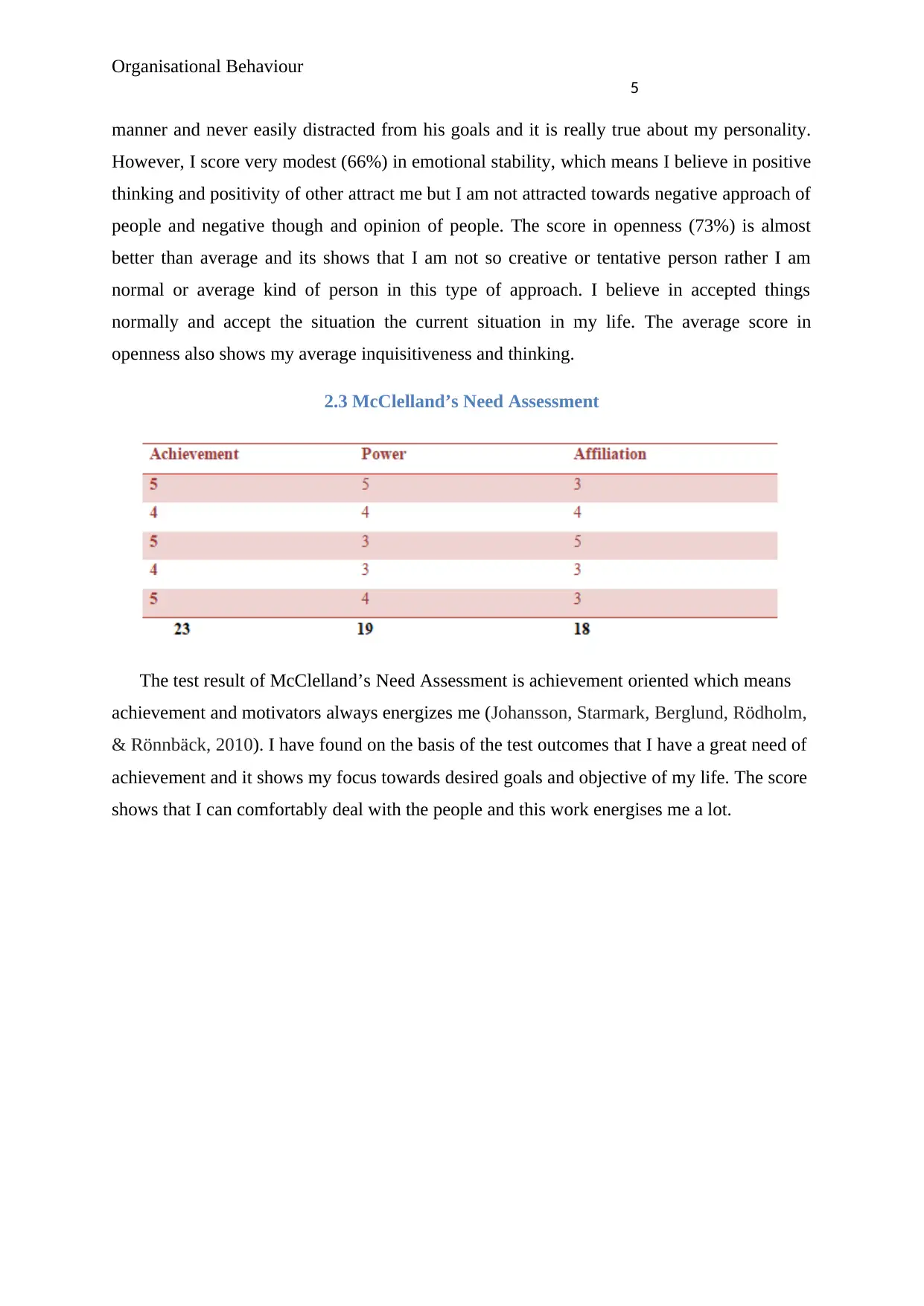
Organisational Behaviour
5
manner and never easily distracted from his goals and it is really true about my personality.
However, I score very modest (66%) in emotional stability, which means I believe in positive
thinking and positivity of other attract me but I am not attracted towards negative approach of
people and negative though and opinion of people. The score in openness (73%) is almost
better than average and its shows that I am not so creative or tentative person rather I am
normal or average kind of person in this type of approach. I believe in accepted things
normally and accept the situation the current situation in my life. The average score in
openness also shows my average inquisitiveness and thinking.
2.3 McClelland’s Need Assessment
The test result of McClelland’s Need Assessment is achievement oriented which means
achievement and motivators always energizes me (Johansson, Starmark, Berglund, Rödholm,
& Rönnbäck, 2010). I have found on the basis of the test outcomes that I have a great need of
achievement and it shows my focus towards desired goals and objective of my life. The score
shows that I can comfortably deal with the people and this work energises me a lot.
5
manner and never easily distracted from his goals and it is really true about my personality.
However, I score very modest (66%) in emotional stability, which means I believe in positive
thinking and positivity of other attract me but I am not attracted towards negative approach of
people and negative though and opinion of people. The score in openness (73%) is almost
better than average and its shows that I am not so creative or tentative person rather I am
normal or average kind of person in this type of approach. I believe in accepted things
normally and accept the situation the current situation in my life. The average score in
openness also shows my average inquisitiveness and thinking.
2.3 McClelland’s Need Assessment
The test result of McClelland’s Need Assessment is achievement oriented which means
achievement and motivators always energizes me (Johansson, Starmark, Berglund, Rödholm,
& Rönnbäck, 2010). I have found on the basis of the test outcomes that I have a great need of
achievement and it shows my focus towards desired goals and objective of my life. The score
shows that I can comfortably deal with the people and this work energises me a lot.
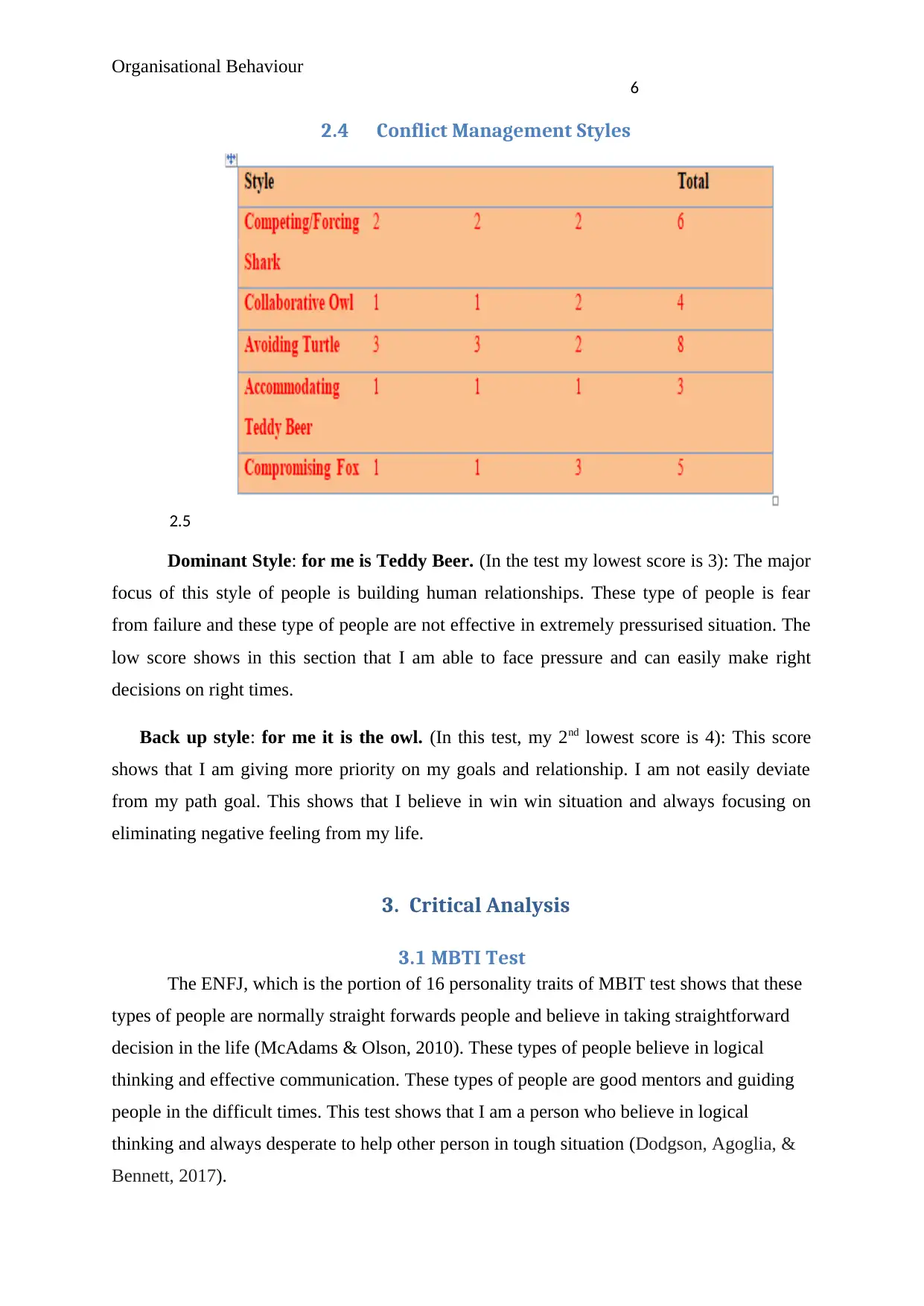
Organisational Behaviour
6
2.4 Conflict Management Styles
2.5
Dominant Style: for me is Teddy Beer. (In the test my lowest score is 3): The major
focus of this style of people is building human relationships. These type of people is fear
from failure and these type of people are not effective in extremely pressurised situation. The
low score shows in this section that I am able to face pressure and can easily make right
decisions on right times.
Back up style: for me it is the owl. (In this test, my 2nd lowest score is 4): This score
shows that I am giving more priority on my goals and relationship. I am not easily deviate
from my path goal. This shows that I believe in win win situation and always focusing on
eliminating negative feeling from my life.
3. Critical Analysis
3.1 MBTI Test
The ENFJ, which is the portion of 16 personality traits of MBIT test shows that these
types of people are normally straight forwards people and believe in taking straightforward
decision in the life (McAdams & Olson, 2010). These types of people believe in logical
thinking and effective communication. These types of people are good mentors and guiding
people in the difficult times. This test shows that I am a person who believe in logical
thinking and always desperate to help other person in tough situation (Dodgson, Agoglia, &
Bennett, 2017).
6
2.4 Conflict Management Styles
2.5
Dominant Style: for me is Teddy Beer. (In the test my lowest score is 3): The major
focus of this style of people is building human relationships. These type of people is fear
from failure and these type of people are not effective in extremely pressurised situation. The
low score shows in this section that I am able to face pressure and can easily make right
decisions on right times.
Back up style: for me it is the owl. (In this test, my 2nd lowest score is 4): This score
shows that I am giving more priority on my goals and relationship. I am not easily deviate
from my path goal. This shows that I believe in win win situation and always focusing on
eliminating negative feeling from my life.
3. Critical Analysis
3.1 MBTI Test
The ENFJ, which is the portion of 16 personality traits of MBIT test shows that these
types of people are normally straight forwards people and believe in taking straightforward
decision in the life (McAdams & Olson, 2010). These types of people believe in logical
thinking and effective communication. These types of people are good mentors and guiding
people in the difficult times. This test shows that I am a person who believe in logical
thinking and always desperate to help other person in tough situation (Dodgson, Agoglia, &
Bennett, 2017).
Paraphrase This Document
Need a fresh take? Get an instant paraphrase of this document with our AI Paraphraser
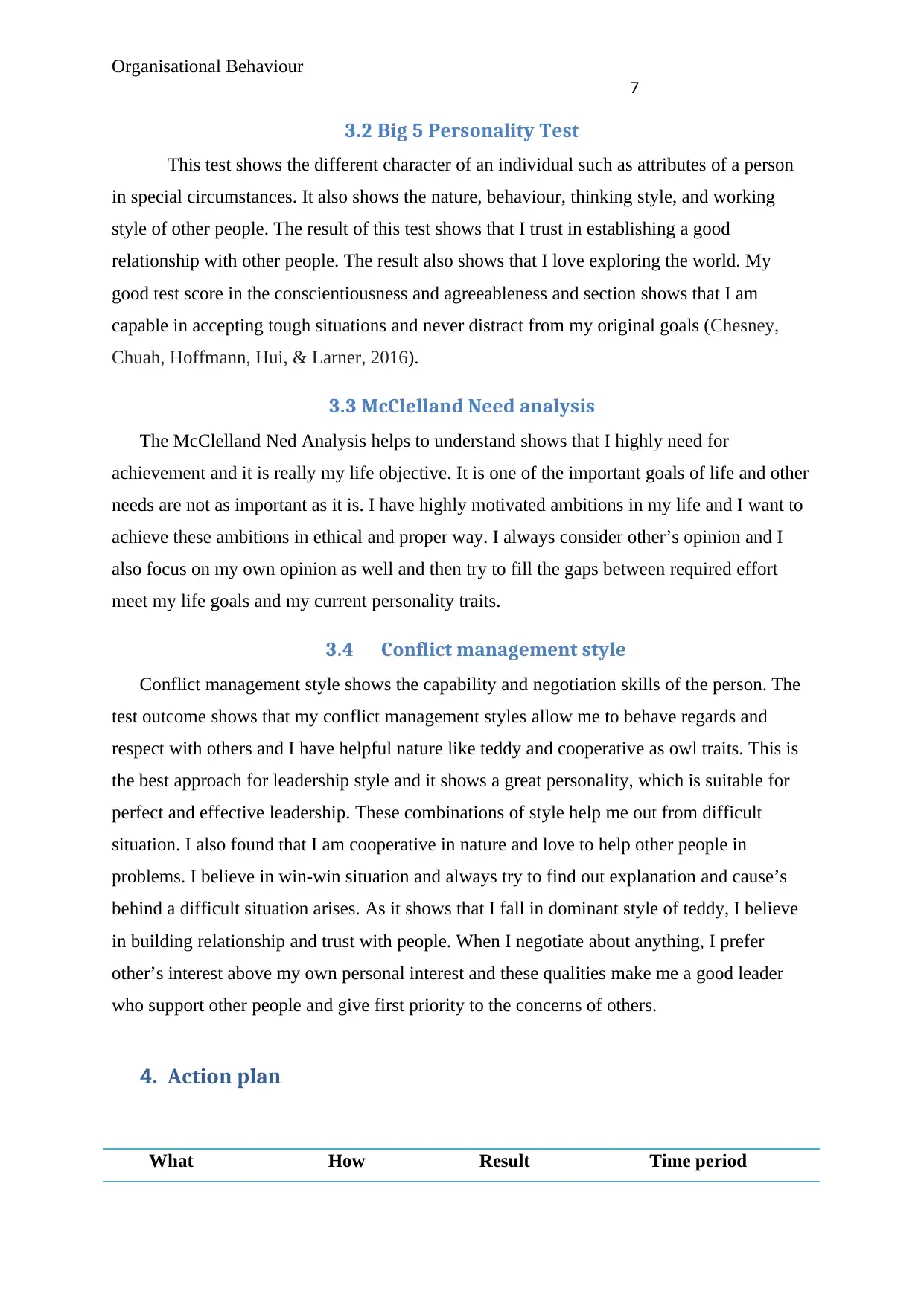
Organisational Behaviour
7
3.2 Big 5 Personality Test
This test shows the different character of an individual such as attributes of a person
in special circumstances. It also shows the nature, behaviour, thinking style, and working
style of other people. The result of this test shows that I trust in establishing a good
relationship with other people. The result also shows that I love exploring the world. My
good test score in the conscientiousness and agreeableness and section shows that I am
capable in accepting tough situations and never distract from my original goals (Chesney,
Chuah, Hoffmann, Hui, & Larner, 2016).
3.3 McClelland Need analysis
The McClelland Ned Analysis helps to understand shows that I highly need for
achievement and it is really my life objective. It is one of the important goals of life and other
needs are not as important as it is. I have highly motivated ambitions in my life and I want to
achieve these ambitions in ethical and proper way. I always consider other’s opinion and I
also focus on my own opinion as well and then try to fill the gaps between required effort
meet my life goals and my current personality traits.
3.4 Conflict management style
Conflict management style shows the capability and negotiation skills of the person. The
test outcome shows that my conflict management styles allow me to behave regards and
respect with others and I have helpful nature like teddy and cooperative as owl traits. This is
the best approach for leadership style and it shows a great personality, which is suitable for
perfect and effective leadership. These combinations of style help me out from difficult
situation. I also found that I am cooperative in nature and love to help other people in
problems. I believe in win-win situation and always try to find out explanation and cause’s
behind a difficult situation arises. As it shows that I fall in dominant style of teddy, I believe
in building relationship and trust with people. When I negotiate about anything, I prefer
other’s interest above my own personal interest and these qualities make me a good leader
who support other people and give first priority to the concerns of others.
4. Action plan
What How Result Time period
7
3.2 Big 5 Personality Test
This test shows the different character of an individual such as attributes of a person
in special circumstances. It also shows the nature, behaviour, thinking style, and working
style of other people. The result of this test shows that I trust in establishing a good
relationship with other people. The result also shows that I love exploring the world. My
good test score in the conscientiousness and agreeableness and section shows that I am
capable in accepting tough situations and never distract from my original goals (Chesney,
Chuah, Hoffmann, Hui, & Larner, 2016).
3.3 McClelland Need analysis
The McClelland Ned Analysis helps to understand shows that I highly need for
achievement and it is really my life objective. It is one of the important goals of life and other
needs are not as important as it is. I have highly motivated ambitions in my life and I want to
achieve these ambitions in ethical and proper way. I always consider other’s opinion and I
also focus on my own opinion as well and then try to fill the gaps between required effort
meet my life goals and my current personality traits.
3.4 Conflict management style
Conflict management style shows the capability and negotiation skills of the person. The
test outcome shows that my conflict management styles allow me to behave regards and
respect with others and I have helpful nature like teddy and cooperative as owl traits. This is
the best approach for leadership style and it shows a great personality, which is suitable for
perfect and effective leadership. These combinations of style help me out from difficult
situation. I also found that I am cooperative in nature and love to help other people in
problems. I believe in win-win situation and always try to find out explanation and cause’s
behind a difficult situation arises. As it shows that I fall in dominant style of teddy, I believe
in building relationship and trust with people. When I negotiate about anything, I prefer
other’s interest above my own personal interest and these qualities make me a good leader
who support other people and give first priority to the concerns of others.
4. Action plan
What How Result Time period
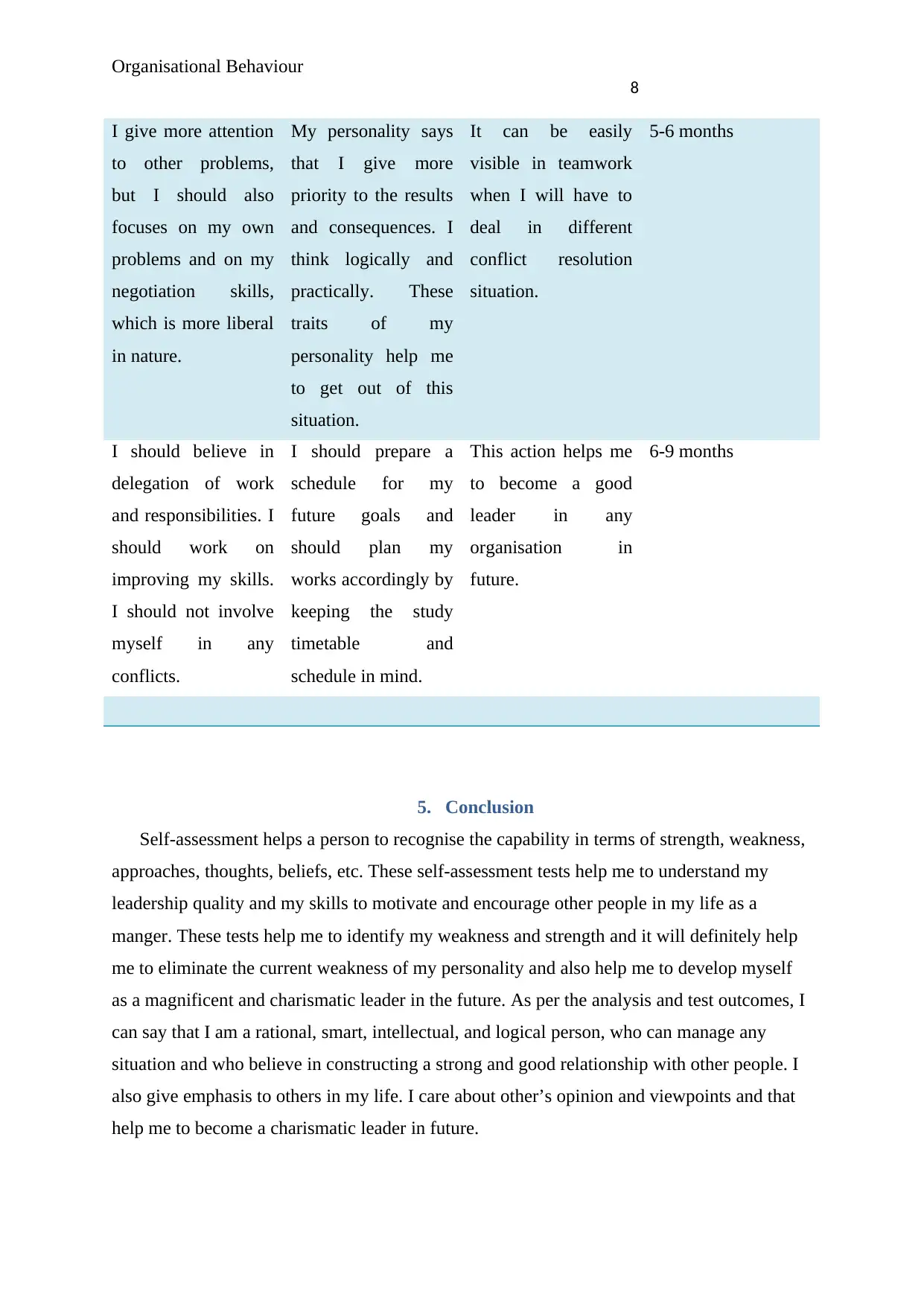
Organisational Behaviour
8
I give more attention
to other problems,
but I should also
focuses on my own
problems and on my
negotiation skills,
which is more liberal
in nature.
My personality says
that I give more
priority to the results
and consequences. I
think logically and
practically. These
traits of my
personality help me
to get out of this
situation.
It can be easily
visible in teamwork
when I will have to
deal in different
conflict resolution
situation.
5-6 months
I should believe in
delegation of work
and responsibilities. I
should work on
improving my skills.
I should not involve
myself in any
conflicts.
I should prepare a
schedule for my
future goals and
should plan my
works accordingly by
keeping the study
timetable and
schedule in mind.
This action helps me
to become a good
leader in any
organisation in
future.
6-9 months
5. Conclusion
Self-assessment helps a person to recognise the capability in terms of strength, weakness,
approaches, thoughts, beliefs, etc. These self-assessment tests help me to understand my
leadership quality and my skills to motivate and encourage other people in my life as a
manger. These tests help me to identify my weakness and strength and it will definitely help
me to eliminate the current weakness of my personality and also help me to develop myself
as a magnificent and charismatic leader in the future. As per the analysis and test outcomes, I
can say that I am a rational, smart, intellectual, and logical person, who can manage any
situation and who believe in constructing a strong and good relationship with other people. I
also give emphasis to others in my life. I care about other’s opinion and viewpoints and that
help me to become a charismatic leader in future.
8
I give more attention
to other problems,
but I should also
focuses on my own
problems and on my
negotiation skills,
which is more liberal
in nature.
My personality says
that I give more
priority to the results
and consequences. I
think logically and
practically. These
traits of my
personality help me
to get out of this
situation.
It can be easily
visible in teamwork
when I will have to
deal in different
conflict resolution
situation.
5-6 months
I should believe in
delegation of work
and responsibilities. I
should work on
improving my skills.
I should not involve
myself in any
conflicts.
I should prepare a
schedule for my
future goals and
should plan my
works accordingly by
keeping the study
timetable and
schedule in mind.
This action helps me
to become a good
leader in any
organisation in
future.
6-9 months
5. Conclusion
Self-assessment helps a person to recognise the capability in terms of strength, weakness,
approaches, thoughts, beliefs, etc. These self-assessment tests help me to understand my
leadership quality and my skills to motivate and encourage other people in my life as a
manger. These tests help me to identify my weakness and strength and it will definitely help
me to eliminate the current weakness of my personality and also help me to develop myself
as a magnificent and charismatic leader in the future. As per the analysis and test outcomes, I
can say that I am a rational, smart, intellectual, and logical person, who can manage any
situation and who believe in constructing a strong and good relationship with other people. I
also give emphasis to others in my life. I care about other’s opinion and viewpoints and that
help me to become a charismatic leader in future.
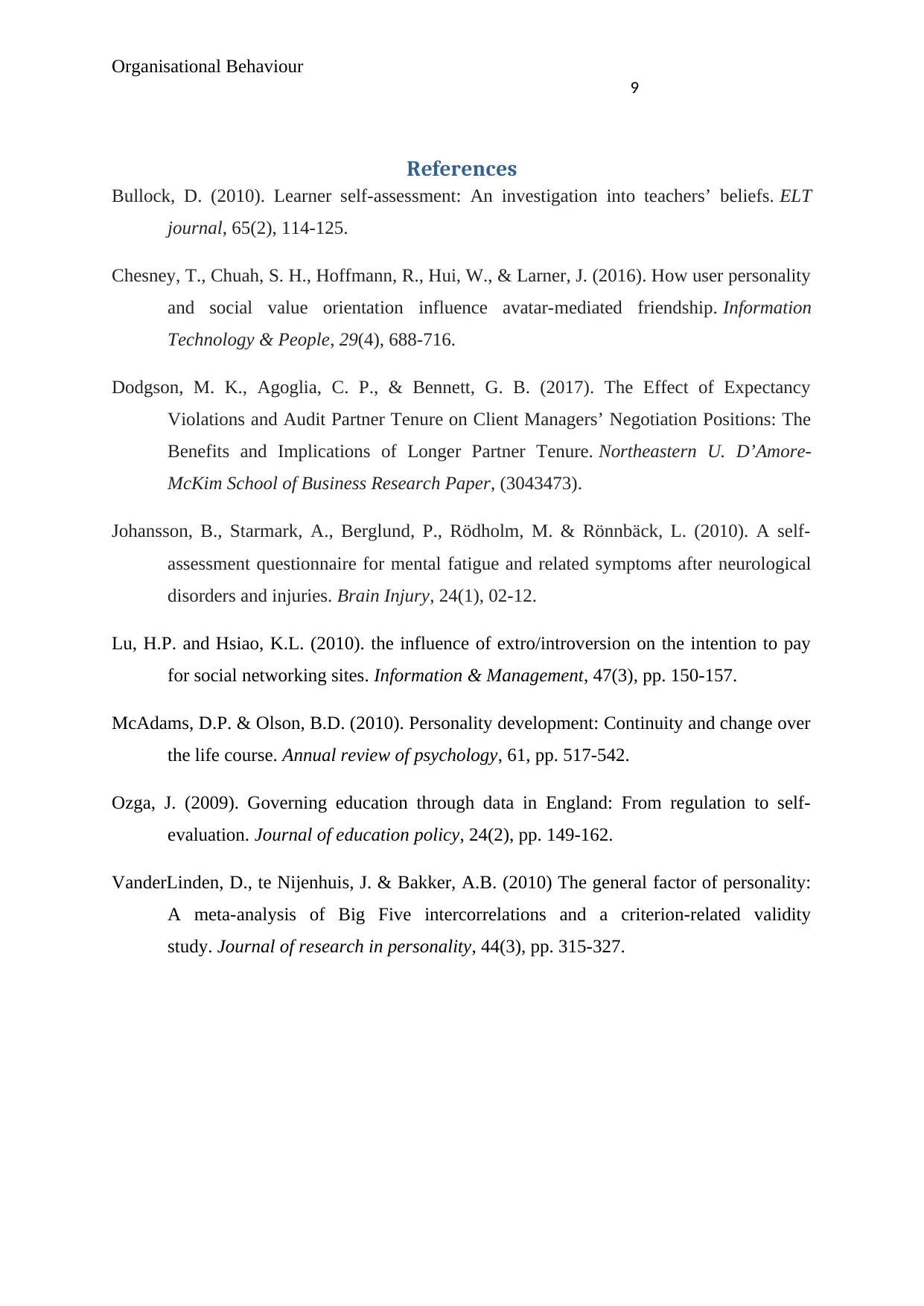
Organisational Behaviour
9
References
Bullock, D. (2010). Learner self-assessment: An investigation into teachers’ beliefs. ELT
journal, 65(2), 114-125.
Chesney, T., Chuah, S. H., Hoffmann, R., Hui, W., & Larner, J. (2016). How user personality
and social value orientation influence avatar-mediated friendship. Information
Technology & People, 29(4), 688-716.
Dodgson, M. K., Agoglia, C. P., & Bennett, G. B. (2017). The Effect of Expectancy
Violations and Audit Partner Tenure on Client Managers’ Negotiation Positions: The
Benefits and Implications of Longer Partner Tenure. Northeastern U. D’Amore-
McKim School of Business Research Paper, (3043473).
Johansson, B., Starmark, A., Berglund, P., Rödholm, M. & Rönnbäck, L. (2010). A self-
assessment questionnaire for mental fatigue and related symptoms after neurological
disorders and injuries. Brain Injury, 24(1), 02-12.
Lu, H.P. and Hsiao, K.L. (2010). the influence of extro/introversion on the intention to pay
for social networking sites. Information & Management, 47(3), pp. 150-157.
McAdams, D.P. & Olson, B.D. (2010). Personality development: Continuity and change over
the life course. Annual review of psychology, 61, pp. 517-542.
Ozga, J. (2009). Governing education through data in England: From regulation to self‐
evaluation. Journal of education policy, 24(2), pp. 149-162.
VanderLinden, D., te Nijenhuis, J. & Bakker, A.B. (2010) The general factor of personality:
A meta-analysis of Big Five intercorrelations and a criterion-related validity
study. Journal of research in personality, 44(3), pp. 315-327.
9
References
Bullock, D. (2010). Learner self-assessment: An investigation into teachers’ beliefs. ELT
journal, 65(2), 114-125.
Chesney, T., Chuah, S. H., Hoffmann, R., Hui, W., & Larner, J. (2016). How user personality
and social value orientation influence avatar-mediated friendship. Information
Technology & People, 29(4), 688-716.
Dodgson, M. K., Agoglia, C. P., & Bennett, G. B. (2017). The Effect of Expectancy
Violations and Audit Partner Tenure on Client Managers’ Negotiation Positions: The
Benefits and Implications of Longer Partner Tenure. Northeastern U. D’Amore-
McKim School of Business Research Paper, (3043473).
Johansson, B., Starmark, A., Berglund, P., Rödholm, M. & Rönnbäck, L. (2010). A self-
assessment questionnaire for mental fatigue and related symptoms after neurological
disorders and injuries. Brain Injury, 24(1), 02-12.
Lu, H.P. and Hsiao, K.L. (2010). the influence of extro/introversion on the intention to pay
for social networking sites. Information & Management, 47(3), pp. 150-157.
McAdams, D.P. & Olson, B.D. (2010). Personality development: Continuity and change over
the life course. Annual review of psychology, 61, pp. 517-542.
Ozga, J. (2009). Governing education through data in England: From regulation to self‐
evaluation. Journal of education policy, 24(2), pp. 149-162.
VanderLinden, D., te Nijenhuis, J. & Bakker, A.B. (2010) The general factor of personality:
A meta-analysis of Big Five intercorrelations and a criterion-related validity
study. Journal of research in personality, 44(3), pp. 315-327.
1 out of 10
Related Documents
Your All-in-One AI-Powered Toolkit for Academic Success.
+13062052269
info@desklib.com
Available 24*7 on WhatsApp / Email
![[object Object]](/_next/static/media/star-bottom.7253800d.svg)
Unlock your academic potential
© 2024 | Zucol Services PVT LTD | All rights reserved.





